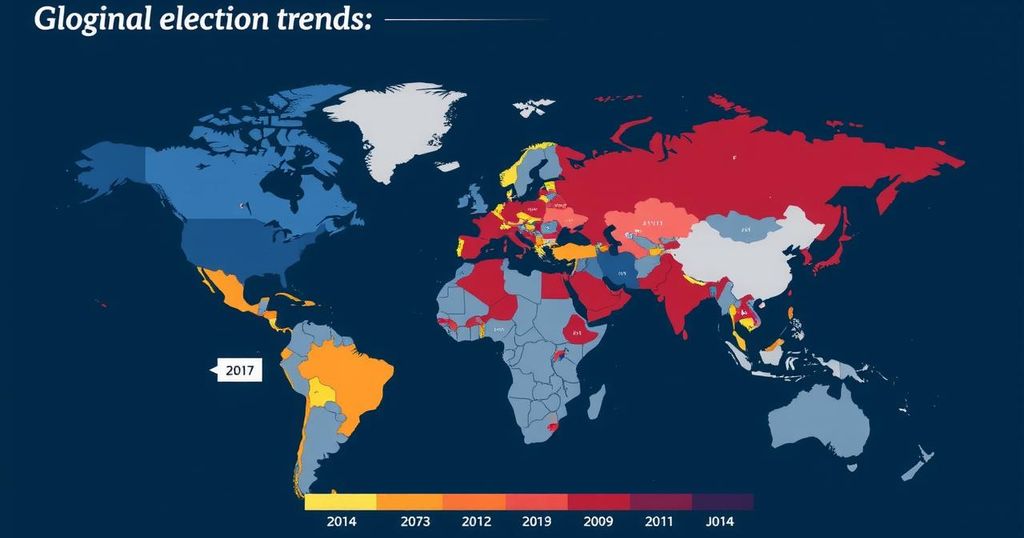Global Trends: The Wave of Electoral Losses for Incumbent Parties Including Democrats
Democrats faced losses in recent elections, aligning with a global trend of incumbent parties suffering defeats. Many countries saw historical losses, while Democrats performed relatively well compared to their global counterparts. Economic conditions and voter dissatisfaction were key factors, with a focus on issues like inflation overshadowing other positive economic indicators. Incumbent advantage diminished globally, signaling potential shifts in future elections.
Democrats are not isolated in their electoral challenges; throughout the world, incumbent parties have suffered significant losses in elections this year. As analysts dissect Vice President Kamala Harris’s campaign and the factors contributing to her defeat, a broader examination reveals that the losses experienced by Democrats are part of a global trend. Across numerous democracies, a significant percentage of incumbent parties lost vote share or legislative seats, reflecting widespread voter discontent. Historically, incumbents have enjoyed advantages, but recent elections have seen notable upsets. Countries such as Japan, Botswana, and South Africa have witnessed long-standing governments lose their majorities. In Senegal, the opposition secured a significant victory for the first time since the nation’s independence. Similar trends occurred in Sri Lanka and across various European nations, all indicating a shift in voter sentiment. Despite these losses in the U.S., Democrats fared comparatively better than many global counterparts, facing only modest losses in certain areas. One explanation for the Democrats’ relatively restrained defeat could be attributed to the U.S. economy’s resilience compared to other nations suffering from economic downturns. While inflation has affected many globally post-pandemic, the U.S. has experienced robust GDP growth and improved real wages. However, voter focus largely remained on inflation and housing costs, which overshadowed more positive economic indicators like wage increases. Successful incumbents in other countries managed to maintain their positions by prioritizing security issues over economic ones. Nations such as Mexico and Finland saw incumbents retain or gain seats by addressing concerns regarding violence and national security. In contrast, the U.S. electoral campaign did not center on these issues, although immigration was a significant concern for voters. Ultimately, the malaise affecting voters globally also permeated the United States, with dissatisfaction over economic conditions playing a crucial role in the electoral outcomes. As the next election cycle approaches, Democrats may take comfort in the fact that they will not face the burden of incumbency, potentially altering their fortune at the polls.
The article discusses the parallel between the Democratic Party’s recent electoral challenges and a broader global trend where incumbent parties have lost elections. It examines these trends in the context of economic conditions and voter dissatisfaction, exploring the specific dynamics that influenced the 2024 elections across numerous democracies. A comparative analysis reveals that while Democrats experienced losses, they were less severe than those faced by many other countries. Contextualizing these developments offers insight into the political landscape both domestically and internationally.
In conclusion, the electoral outcomes for Democrats during this cycle reflect a global discontent with incumbent governments. The findings suggest that while Democrats have endured losses, their performance was relatively strong compared to global trends, primarily due to favorable economic conditions and a lack of focus on security issues. As the political landscape evolves, the absence of incumbency may grant Democrats a strategic advantage in the upcoming election.
Original Source: abcnews.go.com




Post Comment